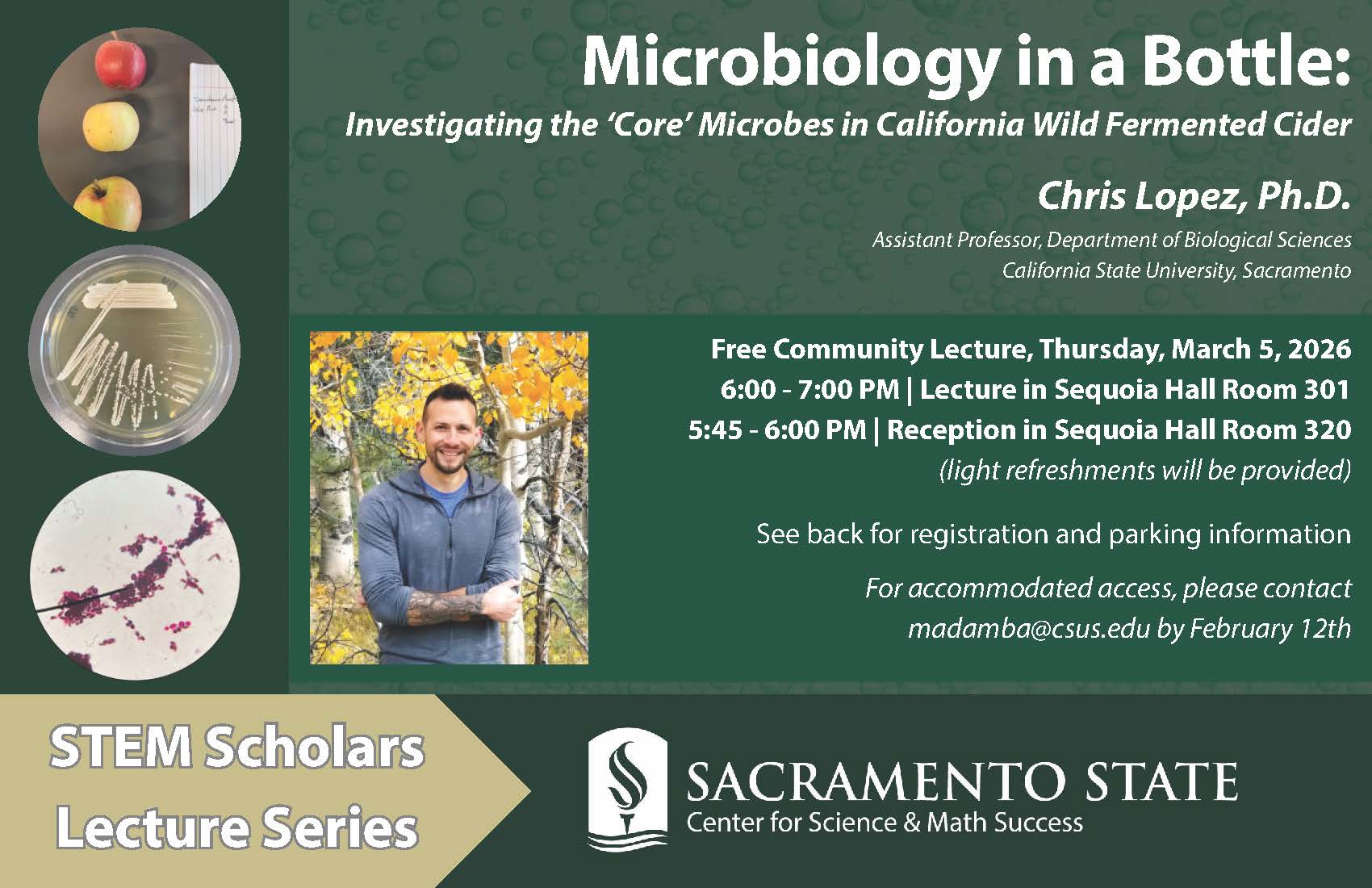Support Page Content
STEM Scholars Lecture Series
The STEM Scholars lectures are designed for the general public. These lectures bring together area K-12 and community college students, faculty, and administrators; local business and industry leaders; CSUS students, faculty and alumni; and local community members to learn more about Sacramento State faculty research and scholarly efforts in STEM fields. The lectures cover a wide range of STEM topics from artificial intelligence to environmental sustainability issues.
Upcoming Lecture
Microbiology in a bottle: Investigating the ‘core’ microbes in California wild fermented cider
Free Community Lecture, Thursday, March 5th 2026
Lecture from 6:00-7:00 PM in Sequoia Hall, Room 301
Reception from 5:45-6:00 PM in Sequoia Hall, Room 320
Parking is free in Parking Structure 2 (PSII) in STUDENT spaces on 3/5 from 4:00-8:00pm. For parking location information, please view our campus map at Parking map

Abstract:
The microorganisms responsible for transforming raw food ingredients into fermented foods like cheese, beer, and cider often act as part of a community, where each community member has a role in shaping the final taste and aroma of the product. Changes in the environment, like temperature or the nutrients in the raw ingredients, can cause differences in the main microbes present in the community, which may alter the flavor of the fermented food. In this talk, I will focus on the bacteria and yeast communities from Northern California involved in the fermentation of apple juice, or must, to cider.
Cider sales in the United States have been steadily increasing following the popularity of the craft beer industry. As with craft beer, there is increasing consumer appreciation and willingness to pay for local cidery brands over industrial cideries. This preference is due to several factors, including the perception of better quality from the use of locally grown apples as well as the use of spontaneous, or wild, fermentation. Wild fermentation relies on the indigenous microbes found on apples for fermentation, creating a direct link between agricultural practices and apple microbiome to cider production. Here, I will present our survey of wild fermented ciders from two Northern California cideries that use low-intervention cider production methods. I will also discuss what we can learn from the ecology of the microbial communities in cider and how this could apply to other fermented foods or other microbial communities more broadly.
Bio:
Dr. Chris Lopez is an Assistant Professor in the Department of Biological Sciences at Sacramento State. He is a California native, receiving his Bachelor’s degree at UC Davis in Animal Science. Later, he completed his Ph.D. in Microbiology at UC Davis investigating how pathogenic bacteria benefit from causing disease in the intestines. Dr. Lopez continued his research in pathogenic bacteria at Vanderbilt University Medical Center in Nashville, TN.
Dr. Lopez started his faculty position at Sacramento State in January 2020, where he primarily teaches classes on microbiology, host-pathogen interactions, and food fermentation. Research in the Lopez lab includes understanding how beneficial and pathogenic bacteria adapt to changes in the intestinal environment. More recently, the Lopez lab has spread to tracking changes in microbial populations during cider fermentation and in evaluating how microbes in cider communities interact with each other. When he’s not teaching or in the lab, Dr. Lopez is out with his running group, Nerds Running at Sac State, and exploring the wonders of fermented foods and beverages. Cheers!